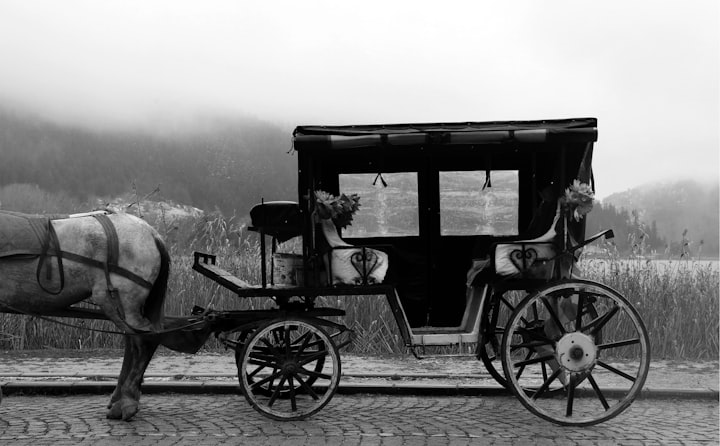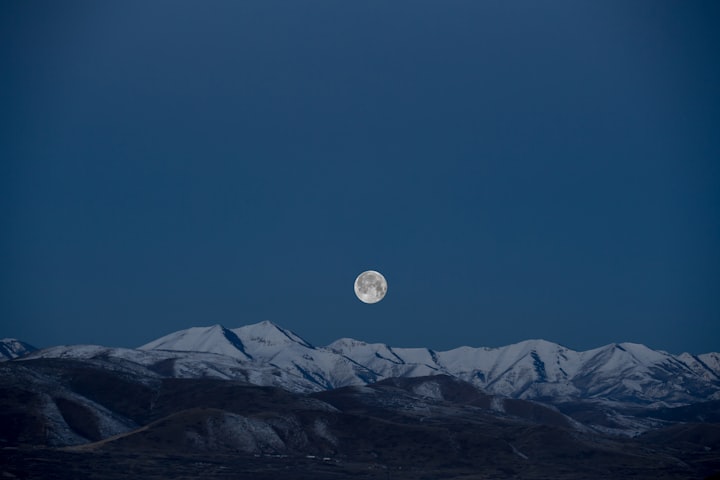
( Note from the author: as an added challenge, I've decided to include all 8 elements from Vocal's Summer Challenge Series in this submission. See if you can find them! Happy writing everyone :] )
---
Keller
1998 words
They were no good to anyone anymore. The florist offered azaleas and carnations. He offered lilies and lilacs and special discount rates on pink roses. But Loui Mae’s favorite flower wasn’t lilies or lilacs, and it sure as Hell wasn’t pink roses. Those marigolds were no good to no one.
Better days had been. Outside the café patio, cruiseliners docked along the wharf. Sea-weary passengers came down the ramps looking for coffee and breakfast, porters in coveralls wheeled around luggage or scrubbed kelp off ships. Stray dogs yipped at shoreline gulls, and the fisheye moon was bloodshot and unwelcoming. Black drapes of clouds at sea, coming today of all days.
“How you like your pastry,” I asked my daughter, Keller.
“It’s pretty good. A little sweeter than I like. Thanks, Pa.”
I picked up my coffee and looked up at the unrighteous clouds. I watched fishermen and dockworkers and the taskmasters overseeing them. And then a lady came from the café and said,
“Mr. Casey?”
I half-turned my body toward her and said, "Yes ma'am?"
“Your chocolate cake is ready.”
When the barber opened, we got seated about the time it started raining. I got my first proper haircut and shave in months. Keller had her hair washed and curled and her natural blonde freshened up. I played a man a game of billiards while Keller’s hair dried out. Not sure what good for seeming how we aimed to be all wet soon again. The man won on the 8-ball, but we shared stories about our children and drank a good glass of whiskey on the barber’s bottle.
As we stood in the entranceway, putting on our coats, the barber came to me and said,
“Mister, I noticed you was riding in on a wagon.”
“Thas correct.”
“Grief, it’s an awful wet day for horses, ain’t it?”
I looked at him. With a bit of a chuckle to myself, hand in my belt, I said, “They’re horses.”
As I opened my wallet to pay him he spoke, softly,
“Don’t worry about it.”
“Don’t worry bout what?”
“I’m assuming that’s her momma out there?” he pointed out the window at the coffin in our wagon.
I looked at him, still holding my wallet. He was a young barber to be sure.
“Well, partner. Thats' my wife, Loui Mae. Since you asked.”
“Say . . . there’s . . . yes! There’s an old barn out back. If you’d like to stow them horses for the day? Assuming you’ve got more errands to run? And you’re sure to have some. I’d be happy to do it. It would be my pleasure. If you’d like someplace to keep her from all this mess. Makes me happy seeing a man out with his daughter like you all. You just don’t see it how you used to.”
I chuckled, opening the door to leave.
“Come on Keller,” I said. “This man thinks we’re a charity case.”
It was raining twice as hard, and if that hadn’t changed my mind, Keller’s face had.
* * *
The barn was old, decrepit, lopsided. Painted white in large lettering on either side was KEEP OUT. It was so old, in fact, it might have been a landmark if it were anywhere else. If it were anywhere else and not in the city where it was an eyesore.
“Just do me a favor and enjoy yourselves! In ancient civilizations, death was celebrated! I've been reading how the Greeks and Romans handled dying,” said the barber.
The barber took the reins from my hands and led the wagon inside. It was hard to see through the webs and shadow. I grabbed Keller by the hand, rubbing the inside of her palm with my big thumb, but just as I stepped forward to go inside the barn, the barber appeared like a magician right at the door and said, “No, no, you go on. You go on, you go on.” And the horses disappeared first, and then the wagon, and then the barndoors shut and sealed like a tomb.
* * *
The car horn startled me. Even in the downpour I could hear it. One car honking at another car. Traffic stopped at a red light.
I’d just been thinking about Loui Mae and what she would have thought about San Francisco since she’d last seen it. I’d just been thinking about Keller and when it was going to hit her. Then the light turned green, and the trolley jerked and started back down the hill. And Keller said,
“I can’t believe we’re riding a real trolley, Pa!”
And I said to her, “Sometimes the rain ain’t so bad if you don’t focus on it’s raining.”
In Chinatown, we ate lunch at a restaurant with a pink neon sign 餐厅. An elderly woman brought us unsweetened tea in a teapot. We ate oily chicken and rice on decorative, porcelain plates, stabbing it mostly with chopsticks we didn’t know how to use. When we finished, Keller held her plate up and I saw there was a crane in the center of it.
“It fits you,” she said.
I nodded along, distracted.
“Pa, look.”
“Hmm?”
She tapped my plate with her chopsticks.
I saw mine had a bull.
* * *
I stood by the change room as Keller changed, looking out onto the main floor. Black suits and black corsets and black baby carriages. A stuffed raven sat above the wainscotting, above the front door. The dressmaker looked seducingly at me from where she stood behind the counter.
“Your daughter, she is so beautiful,” said the dressmaker.
“Thank ye.”
“This is how we say in France, diamant brut.”
I nodded. “Well, thank ye. That’s very kind to say.”
“What is your name?”
“Clyde. Clyde K. Casey.”
“Well, Mr. Casey, the weather here, it is not like Paris. Don’t you think?”
“I'll say.”
“In Paris, when it rains, the city glistens and it sparkles like a gem. Here, when it rains, it drowns everything. Everything drowns.”
“Well, on the plus side, it don’t rain that too often in California.”
“How old is she?”
“14. She'll be 14 in June.”
“And her name?”
“Keller.”
“That is so beautiful. She is why men sail oceans, you know that? Well, you must know. Why men go all over sea and land?”
There was silence. There was thunder.
“May I ask? Was your wife in low spirits before her death?”
Then Keller came back out of the dressing room in the black dress. It was a crepe black bereavement dress that frilled out at the edges like a clamshell. The price tag was white and shaped like a coffin, sticking out from under the arm marked $1. She said,
“She’s right, daddy. The world deserves to know.”
* * *
I was getting anxious to go. Meaning I was getting anxious to get out of the city. Meaning I was getting anxious to get back to my wife and my wagon and my horses.
The dressmaker was waiting for us at the counter with a wooden, square smile as we approached.
“We’re gunna take the dress,” I said.
“Why of course, Mr. Casey. Is there anything else I can do for either you or Miss Keller before you go?"
“No Miss. That’s quite about what we came for.”
“Fans, veils, skir-tss?” she smiled.
“No Miss. No ma’am neither.”
“I understand, Mr. Casey. It'll be just the one dollar.”
As I grabbed the dollar out of my wallet and set it on the counter, I looked through the countertop display case where there were all sorts of jewelry. Black-gemmed necklaces, pendants, rings, all sectioned to the left, laid out on purple velvet. A green square of velvet to the right showcased black diamond jewelry.
“How much for one of them?”
“Which one were you looking at, darling?”
“I was curious about the pearls. Black pearls, I guess they are.”
The dressmaker took out the pearls and held them up for me in the light. She handed them to me. I heard Keller all excited beside me say,
“Pa. Those look like mommas.”
She couldn’t help it not to cry.
“There, there, darling. Here,” the dressmaker handed her a black-lace handkerchief. “Black pearls sell for $30.”
I held them, gave them a bounce for good measure. They felt like pearls, but they also felt like empty bullet casings. They looked like frozen ponds each one of them.
I handed them back over and said,
“Well, we only just got the one dollar for funeral funds this time. Maybe someday.”
“But Pa!!! They look just like the one’s momma used to wear-r-r-r!” she just couldn’t keep together any longer. Just like a thread that’s got to go unravel.
“Of course. Thank you for coming by despite the weather. I am truly sorry again for your loss. You know . . . I might have an extra bonnet lying around I can throw in for you. It would really make me feel good to do it.”
“Now, we don't need—”
“I insist! Miss Keller must have a bonnet! She’s distraught without pearls, the least I or anyone can do is give her a bonnet!”
The dressmaker took off rolling on a ladder, rummaging through this shelf and that shelf, rambling on about how much it would please her if she could only find the one she was thinking of. She was altogether different in spirit and tone. And then, after a moment with no luck at all, a little bell rang at the entrance.
A pear-shaped woman entered the establishment in a mink tippet, with hair like a wedding cake how it was all coifed and wrapped in pearls. She was barely wet, I was unsure how until I saw the balancing act right behind her. A young, sickly-slender man, soaking, like a stench-secreting ferret, held a stack of bags in one hand, and a parasol in the other. He all but caught the door with a toe to set down the bags inside. One, in particular, a brown paper box, was most mysterious. It was monsooning out. The streets were flooded. Water bounced and puddled in through the doorway. Then, the all-dry fat lady announced herself to the dressmaker, in a most theatrical, marvelous way:
“The food! You would think a well-recognized cruiseliner would know seafood of all things. And the tradewinds! And the stock market! And the diamonds they’d try to sell to you! Uh! Ah! Embarrassing, isn’t it? I’m embarrassed for one.”
All the while the sleek, wet gentlemen portered in a dozen handsome pieces of luggage, one by one, only getting wetter, so that by the time he entered and shut the door behind him, he was black as a black man. He stood holding with him a type of dog I’d never seen before, white and shaggy, small and like a lamb. He set it down. It, too, was dry. And the dressmaker, curious, entertained, came off her ladder and hurried over to the pear-tree-of-a-woman, all but screaming like a peacock in French and in Albanian and in Latin and so forth. And my dollar sat there, stiff on the counter, starting to crinkle up from the edges, like something rolled up too long or dead too many days. The jetblack jewelry glistening in the display case. The black-lace handkerchief in Keller’s hand, wet now with snot and tears, folded over like a soggy leaf. Her crying now hysteria. And as the dressmaker screamed and hugged the pear tree lady, and screamed and screamed again—and tongue kissed the dog, and took off her animal fur and handed it to the sopping-wet man—the fat lady, pink in the jowls and black in the eyes and blue in the lips like an opera singer, wearing blaring, bright-red jewelry, reeking of musky perfume, looked over at us and said, “Do they want something? Get rid of them so we can be.”
About the Creator
H.C. Muhs
✌🏽 & 🖤
Hayden
(he/him/they/them)
Multidisciplinary writer: novelist, memoirist, essayist, poet.






Comments
There are no comments for this story
Be the first to respond and start the conversation.